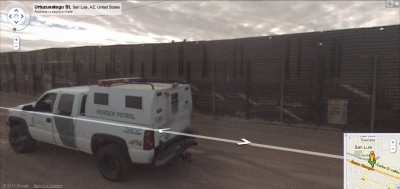
Arizona’s controversial immigration bill, SB 1070 {along with provisions from HB 2162} [pdf of 1070], is days from going into effect and a maelstrom of lawsuits are heating up. Those who haven’t lived in a state bordering with México might not be familiar with how heated of a topic immigration can be, although various polls state that many Americans, not just Arizonans, support the bill.
The bill, which became law as the Support Our Law Enforcement and Safe Neighborhoods Act that Governor Brewer signed in April has been in the cards for a while. This article from the Arizona Republic shows how this “local” issue stemmed from frustration about Federal immigration policy and enforcement in Arizona, as well as noting how nobody expected a firestorm in the national spotlight::
“‘I have never felt the racism that you are feeling in Arizona today because of this bill,’ said Mary Rose Wilcox, a Democratic Maricopa County supervisor who is hoping U.S. District Judge Susan Bolton will block SB 1070 from going into effect.
The furious, and fearful, reaction to Brewer’s decision to sign the bill caught both backers and opponents of the legislation off guard.
‘The majority of us who voted yes on that bill, myself included, did not expect or encourage an outcry from the public,’ said state Rep. Michele Reagan, R-Scottsdale. ‘The majority of us just voted for it because we thought we could try to fix the problem. Nobody envisioned boycotts. Nobody anticipated the emotion, the prayer vigils. The attitude was: These are the laws, let’s start following them.'”
On the legal front, there is the Constitutionality aspect, with complaints being filed and the DoJ getting into the mix {both links to the Constitutional Law Prof Blog}, along with how supremacy and preemption factor into the legality. While legal types argue issues of whether Arizona state law with the Act conflicts with or embodies “concurrent enforcement” of federal immigration and naturalization laws. The Act is in a grey area of state criminal law and federal immigration law and policy.
Politically, the dividing line is roughly along party affiliation with Republicans supporting it and Democrats opposing it. Given the rough shape of the economy and joblessness, getting tough on immigration is an easy issue to get support for. Republican Governor Jan Brewer got a boost in the polls after signing the bill and is ahead of her Democratic challenger. Nevertheless, not all Republicans support the law, including Jeb Bush and Karl Rove. It’s a tricky issue for the Republicans, who want to court Latino voters and many of whom aren’t on board with this type of law and may be another issue that can divide, not unite the Republican party. The NY Times stated that immigration is also a touchy issue for the Democrats, but to a lesser degree, and that states are rushing to craft their own legislation, which may lead to a patchwork of laws, rather than a comprehensive national approach.
The problem I see with the law is that it really fails to acknowledge the social reality of what’s going on and is likely to have bad unintended consequences. Some in law enforcement {there’s no consensus on this} are concerned that undocumented immigrants will fear them, making their jobs more difficult. I’ve worked on projects for the James Irvine Foundation earlier this decade and one of the issues that cropped up was the institutional barriers that prevented undocumented immigrants from engaging in society. This manifested in a fear of law enforcement and a reluctance to engage in health and social services, which is borne out by statistics. Some may see this as a good thing, as in lower costs, but I see it as increasing costs particularly when it comes to health care, due to less preventative medicine, increased risk for the spreading of infectious diseases, and greater utilization of emergent care facilities for primary care. Additionally, in Arizona, while causality cannot be determined, there are reports that Latinos may be leaving the state and those who are eligible to vote are…registering as Democrats.
What’s needed is for the federal government to step up to the plate and make the tough choices on immigration. I’m not holding my breath that the Obama administration or Congress will do anything before the November elections.
{In the future, I’ll blog about the economics of immigration and this one misguided project I worked on {but wasn’t the principal investigator on} that had a strange take on the industrial organization of agriculture.}
Song:: MIA-“Pull Up the People”
Twitterversion:: [blog] The sturm & drang of Arizona’s immigration bill. Will Obama or Congress step up to the plate—in an election year? @Prof_K

Comments 1
Ed — July 27, 2010
I have heard that some amount, perhaps a majority, of Latinos who have recently become citizens support the Arizona law. I guess they figure that if they had to go through a long process to citizenship, so should others (or those others should leave).
I will say also that if we are serious about reducing the number of illegal aliens (or undocumented immigrants or whatever you want to call them) we need to go after and prosecute the American citizens who hire "illegals", and we need to do it in a big way. That would have the effect of reducing demand for "undocumented" labor. It would also mean that American citizens would be hired for those jobs, and they would be protected by OSHA rules ("illegals" are presumably too afraid to file OSHA complaints for fear of being deported). But then too the price of fruits and vegetables and chicken and beef (ground or otherwise) and replacement roofs would go up, because of the cost of meeting safety guidelines now routinely ignored. Would all of America be so happy that more citizens have jobs that they would not mind paying more for these and other things?